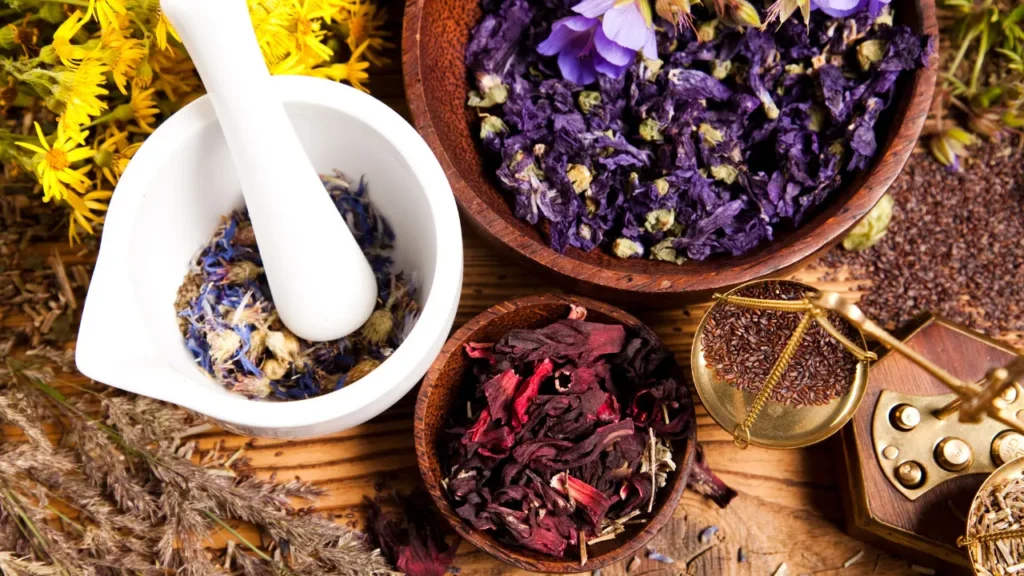The lesser-known herb Polygala amarella, which is endemic to northern Europe, Asia, and North America, is a member of the Polygalaceae family. Due to its extensive health benefits, it has been used for centuries in herbal medicine despite its relative obscurity in popular culture. In order to support safe use of Bitter Milkwort as a nutritional supplement, this in-depth review tries to clarify the chemistry, physiological mechanisms, health advantages, ideal dosage, side effects, and probable substance interactions.
You May Also Like:
Diamond CBD Gummies vs. Joy Organics CBD Gummies
CBD for Concentration: The Productivity Hack for Energy and Focus
Bitter Milkwort: Benefits, Dosage, Side Effects, Drug Interactions, and Other Important Information is an original (NootropicsPlanet) article.
Nature of Bitter Milkwort
The perennial herb Polygala amarella, often known as bitter milkwort, can reach a height of 10 to 30 cm. In the northern regions of Europe, Asia, and North America, it is frequently found in meadows, grasslands, and open woods. The plant has alternating, tiny leaves that are 2-4 cm long and a slender, wiry stalk. Small and ranging in colour from light blue to purple, the flowers of bitter milkwort grow in dense clusters near the stem’s apex. The fruit is actually a capsule that is filled with countless, tiny seeds that are spread by wind or small animals.
The term “Milkwort” comes from the Greek words “poly” (many) and “gala” (milk). It alludes to the long-ago idea that the plant may help nursing mothers produce more milk. To distinguish it from other species of the Polygala genus, which have a bitter taste, the epithet “Bitter” is added.
Health Benefits of Bitter Milkwort
- Cognitive Enhancement: Bitter Milkwort has been used for centuries to enhance cognition, and current research has proven this to be true. In animal studies, its flavonoid and xanthone components have been found to improve learning and memory. This effect may be caused by an increase in neurotransmitter levels, stimulation of neurogenesis, and enhancement of synaptic plasticity.
- Anti-inflammatory Effects and Pain Relief: Studies using diverse in vitro and in vivo models have shown bitter milkwort to have anti-inflammatory characteristics. This suggests potential uses for the treatment of inflammatory diseases such as arthritis and inflammatory bowel disease. Additionally, its analgesic effects have been linked to the modulation of pain-related neurotransmitters and the inhibition of prostaglandin synthesis.
- Immunological Support: The bitter milkwort’s saponin components have immunomodulatory effects that may improve immunological performance by increasing cytokine production and the activity of macrophages and natural killer (NK) cells. These acts may increase general immunity and aid in the prevention of illnesses.
- Cardiovascular Health: It has been demonstrated that bitter milkwort has cardioprotective effects, mainly because of its antioxidant and anti-inflammatory qualities. By lowering oxidative stress and inflammation in the vascular endothelium, its bioactive components can stop atherosclerosis from forming and worsening. Furthermore, the cholesterol-lowering potential of Bitter Milkwort’s saponins may help to improve cardiovascular health.

Chemistry of Bitter Milkwort
Flavonoids, saponins, and xanthones make up the majority of Bitter Milkwort’s chemical components. Polyphenolic substances called flavonoids are renowned for having anti-inflammatory, anti-carcinogenic, and antioxidant characteristics. Glycosides known as saponins have a variety of pharmacological effects, including the ability to reduce cholesterol and modulate the immune system.
Xanthones are a group of heterocyclic molecules that include oxygen. They have a variety of biological properties, such as anti-inflammatory, antioxidant, and anti-cancer actions. The substances work together to explain Bitter Milkwort’s many health benefits.
Physiological Mechanisms of Bitter Milkwort
Its complex blend of bioactive substances, principally flavonoids, saponins, and xanthones, which exert their effects through numerous cellular and molecular routes, are responsible for the physiological mechanisms behind the actions of bitter milkwort.
- Antioxidant Activity: By scavenging free radicals and reactive oxygen species (ROS), the flavonoid and xanthone components of bitter milkwort display strong antioxidant activity. They also activate natural antioxidant enzymes including glutathione peroxidase (GPx), catalase, and superoxide dismutase (SOD), which cooperate to shield cells from oxidative damage.
- Anti-inflammatory Effects: Flavonoids and xanthones are principally responsible for Bitter Milkwort’s anti-inflammatory effects. These substances block the activation of nuclear factor-kappa B (NF-B), a transcription factor that controls inflammation, as well as the expression of pro-inflammatory cytokines including tumour necrosis factor-alpha (TNF-alpha) and interleukin-6 (IL-6).
- Neuroprotection: It has been demonstrated that the flavonoids and xanthones in bitter milkwort have antioxidant and anti-inflammatory properties that have neuroprotective benefits. Additionally, they control the activity of neurotransmitters necessary for healthy brain function, including dopamine and acetylcholine.


Optimal Dosage of Bitter Milkwort
The ideal dosage of Bitter Milkwort as a nutritional supplement relies on a number of variables. These include the person’s age, weight, and general state of health. There is currently insufficient scientific data to identify a recommended dosage for bitter milkwort. An oral dose of 3–9 g of bitter milkwort extract per day, given in divided doses, may provide therapeutic effects. Anecdotal evidence and conventional use support this.
Before beginning any supplements regimen, speak with a healthcare practitioner. They may offer individualized suggestions based on patient needs and medical history.
Side Effects of Bitter Milkwort
When used in moderation, bitter milkwort is usually regarded as safe. However, some people may experience negative effects like nausea, vomiting, or allergic reactions. It is essential to begin with a modest dose and increase it gradually while keeping an eye out for any negative effects. Before taking Bitter Milkwort as a supplement, anyone who is pregnant, nursing, has pre-existing medical conditions, or is taking medication should talk to a doctor.


Potential Substance Interactions with Bitter Milkwort
There is some possibility for interactions between bitter milkwort and other chemicals, although there isn’t much scientific data to support it.
- Anticoagulants and Antiplatelet Drugs: The flavonoid components of bitter milkwort may have anticoagulant and antiplatelet qualities. This means that they may enhance the effects of drugs like warfarin, heparin, or clopidogrel. When taking Bitter Milkwort as a supplement, people who are taking these medications should use caution.
- Antihypertensive Drugs: Bitter Milkwort may have blood pressure-lowering effects that may interact with antihypertensive drugs. Before combining Bitter Milkwort with hypotensive medications, it is crucial to monitor blood pressure levels and speak with a healthcare provider.
Best Responsible Use of Bitter Milkwort
It is essential to take into account the following recommendations to guarantee the optimum ethical usage of bitter milkwort as a nutritional supplement:
- Source: Buy bitter milkwort from a trustworthy supplier who ensures the product’s quality and purity. To be sure the supplement satisfies safety and quality requirements, look for third-party testing or certification.
- Dosage: Begin with a modest dose and raise it gradually while watching for any negative effects. Despite the lack of a standardized dosage for bitter milkwort, conventional wisdom advises taking 300–500 mg in divided doses every day.
- Consultation: Before beginning any supplements plan, speak with a medical expert, especially if you’re expecting, nursing, have a medical condition, or are on medication. A healthcare professional can offer advice that is tailored to your needs and medical background.
- Allergies and Sensitivities: Avoid taking the supplement if you are known to be allergic or sensitive to any of the ingredients in bitter milkwort. Discontinue use and seek medical advice if you have any negative side effects, such as nausea, stomach pain, or allergic reactions.
- Watch for Interactions: If you take anticoagulant, antiplatelet, or hypotensive drugs in particular, be mindful of possible drug interactions with bitter milkwort. For advice on how to handle potential interactions, speak with a healthcare practitioner.
- Adhere to Label Directions: Always adhere to the dosage, administration schedule, and any instructions on the label supplied by the manufacturer.
- Duration of Use: Follow a healthcare professional’s advice and use Bitter Milkwort as a supplement for only a short time. Any supplement used for a prolonged period of time needs to be periodically assessed to make sure it is still safe and effective.
Following these recommendations will help you use Bitter Milkwort as a nutritional supplement responsibly, maximizing its potential health advantages while lowering any dangers or adverse effects.
Bitter Milkwort:
Conclusion
This lesser-known herb has centuries of traditional use. It invites us to appreciate the synergy of its bioactive components. They impact cognitive function, inflammation modulation, immune system support, and cardiovascular health. However, it also demands a responsible approach. It reminds us that the path to well-being involves understanding our bodies’ unique responses and heeding the guidance of healthcare professionals.
Bitter Milkwort becomes more than a supplement. It transforms into a metaphor for our relationship with nature’s wisdom. As we weave its benefits into our lives, let’s do so with a sense of reverence. We should recognize that nature’s offerings are vast, diverse, and often nuanced.


References:
- Flavonoids: Antioxidants Help the Mind. Retrieved from: https://www.psychologytoday.com/intl/articles/200307/flavonoids-antioxidants-help-the-mind
- Thinleaf Milkwort Root. Retrieved from: https://www.allthingshealth.com/en-my/glossary/thinleaf-milkwort-root/
- Natural flu remedies to try at home. Retrieved from: https://www.medicalnewstoday.com/articles/natural-fluremedies#:~:text=Milkwort%20contains%20antiviral%20compounds%20called,due%20to%20the%20flu%20viruses.
Important Note: The information contained in this article is for general informational purposes only, and should not be construed as health or medical advice, nor is it intended to diagnose, prevent, treat, or cure any disease or health condition. Before embarking on any diet, fitness regimen, or program of nutritional supplementation, it is advisable to consult your healthcare professional in order to determine its safety and probable efficacy in terms of your state of health.
Regarding Nutritional Supplements Or Other Non-Prescription Health Products: If any nutritional supplements or other non-prescription health products are mentioned in the foregoing article, any claims or statements made about them have not been evaluated by the U.S. Food and Drug Administration, and such nutritional supplements or other health products are not intended to diagnose, treat, cure, or prevent any disease.
